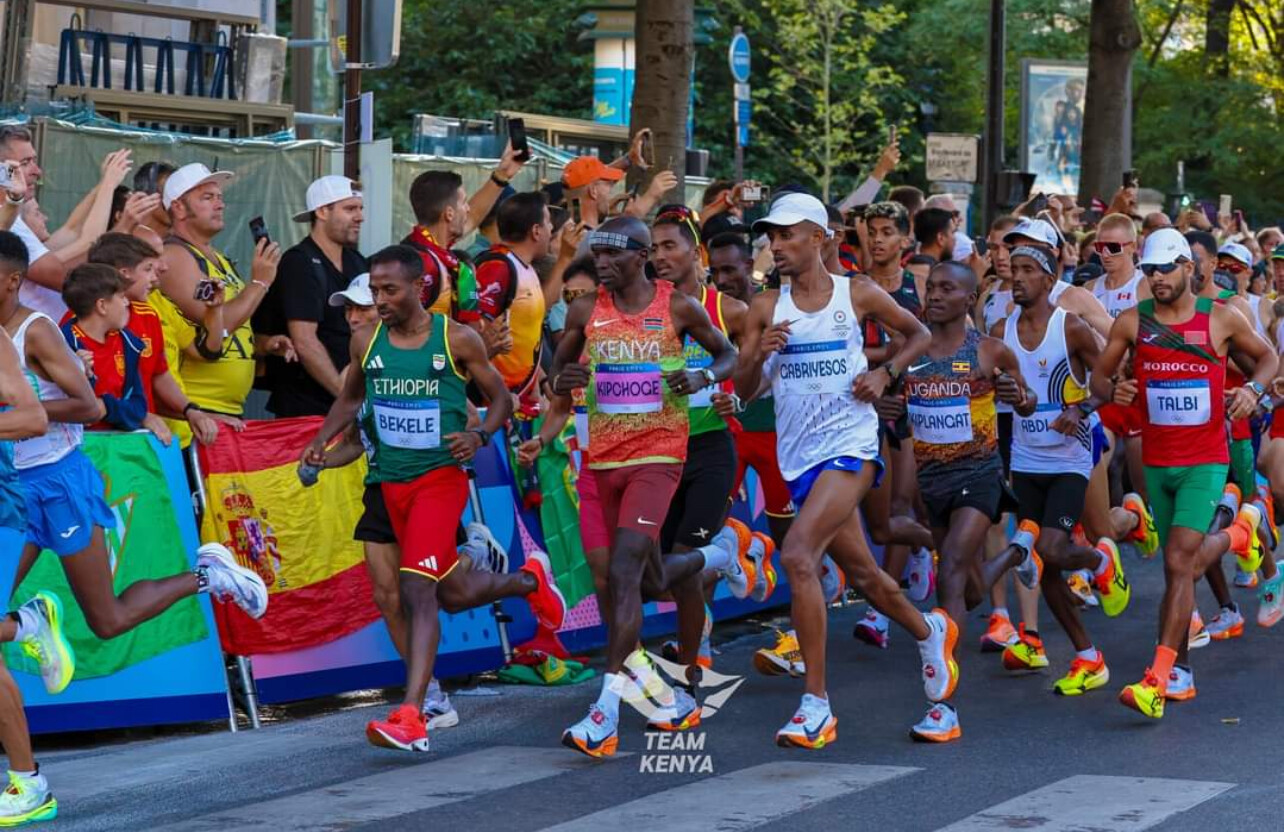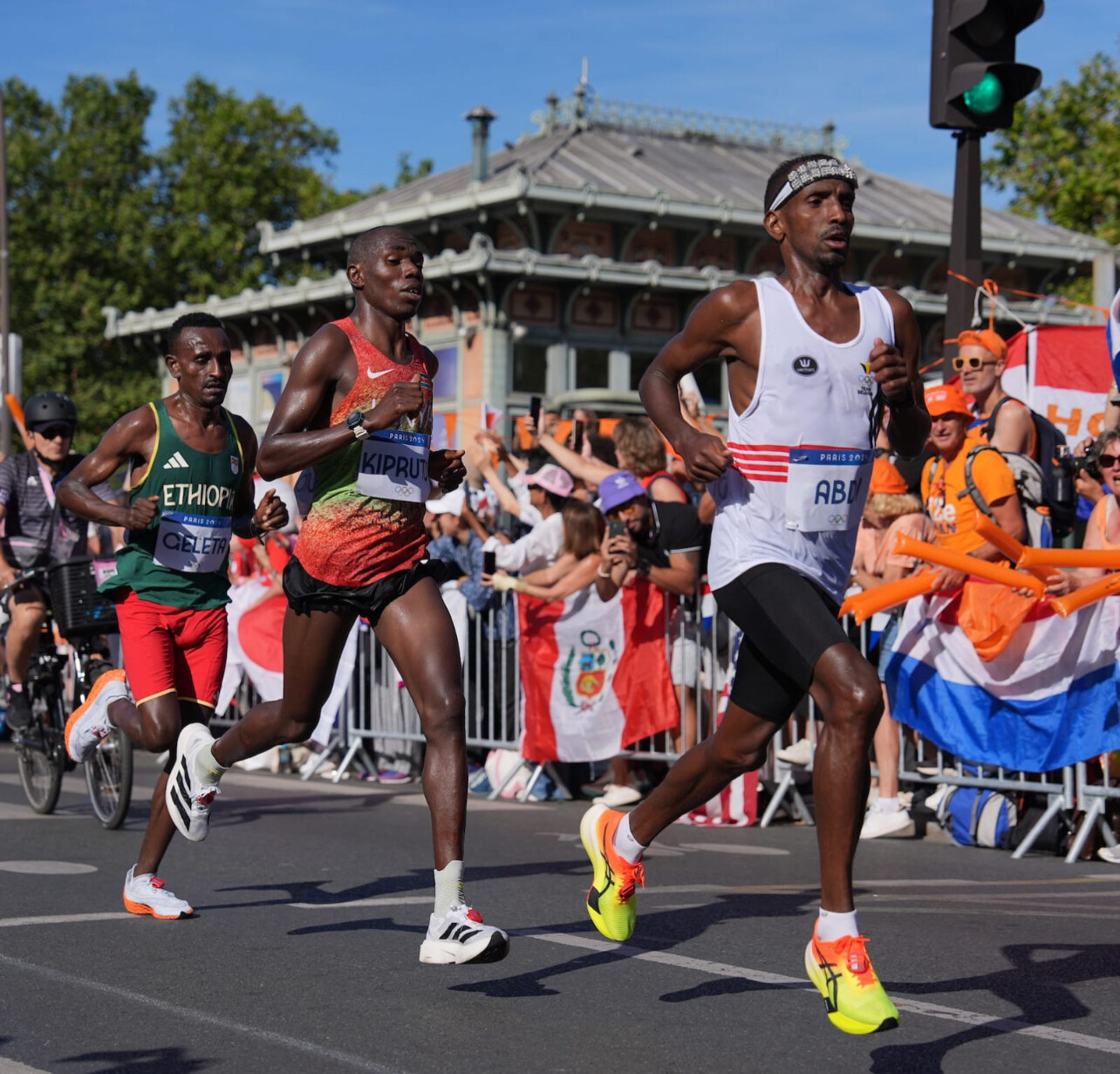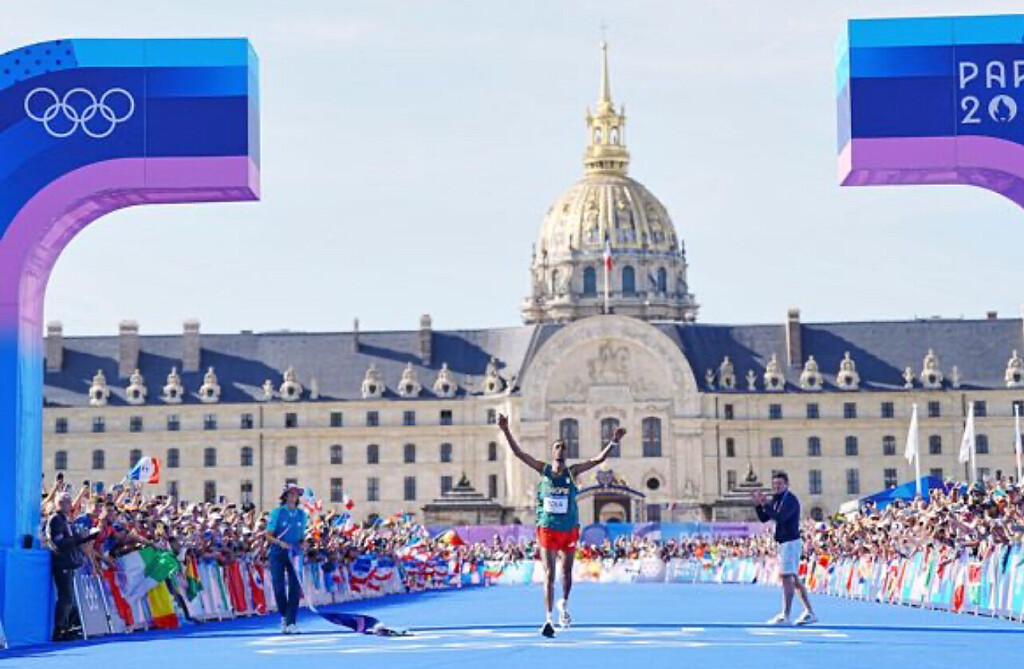Running News Daily
Running News Daily is edited by Bob Anderson. Send your news items to bob@mybestruns.com Advertising opportunities available. Train the Kenyan Way at KATA Kenya and Portugal owned and operated by Bob Anderson. Be sure to catch our movie A Long Run the movie KATA Running Camps and KATA Potato Farms - 31 now open in Kenya! https://kata.ke/
Index to Daily Posts · Sign Up For Updates · Run The World Feed
Ethiopia’s late sub Tola wins marathon in Olympic record in brutal conditions over hugely challenging course
Tamirat Tola, called into the Ethiopian team as a late replacement, won the men’s marathon title in an Olympic record of 2:06:26 in brutal heat and humidity over a course of hugely demanding hills, with Belgium’s Bashir Abdi earning silver in 2:06:47.
Kenya’s Benson Kipruto, fastest in the world this year after winning the Tokyo marathon in 2:02:16, marked his Olympic debut with bronze in 2:07:00 on a day when his 39-year-old compatriot Eliud Kipchoge, seeking a third consecutive title, failed to finish.

Britain’s Emile Cairess, making his Olympic debut, finished in fourth place, clocking 2:07:29 after moving past Ethiopia’s Deresa Geleta in the finishing stages, with the latter recording 2:07:31 and finishing a second ahead of Japan’s Akira Akasaki, who set a personal best.
In the circumstances it was scarcely creditable that Tola bettered the Olympic mark of 2:06:32 set at the Beijing 2008 Games by the late Kenyan runner Sammy Wanjiru.
Huge crowds lined the route in the closing stages, and the spectacle concluded amid packed grandstands in front of Les Invalides, its gilded dome glinting in the morning sunshine.

On a day like this, on a course like this, there was something fitting about the race concluding alongside the building constructed in the 17th century as a haven for disabled soldiers. Everyone completing the course today was a warrior.
Tola, the 2022 world champion, thus joins the fabled list of fellow Ethiopians who have won this prized race – Abebe Bikila in 1960 and 1964, Mamo Wolde in 1968 and Gezahegne Abera in 2000 – and added gold to the Olympic 10,000m bronze he won in 2016.
For an Ethiopian team that has not enjoyed its customary success on the track, this was a day of days – and they will have hopes of further success when the athletics programme concludes with the women’s marathon tomorrow.
“I am happy today because I fulfilled my goal,” said Tola, Ethiopia’s first gold medallist of these Games. “I prepared well. I trained hard so I could win. In my life, this is my great achievement.
“I was the reserve in the Ethiopian team, but when Sisay (Lemma) had injuries, then I had a chance to represent him. I was fully prepared and knew I could fulfil my dream. I am happy to do that today.
“This is the Olympics and it is not easy to win the Olympic Games, not at all. I am very proud, very happy.”
Abdi, who has recently recovered from a stress fracture of the hip, commented: "The course was very tough today. I tried not to lose a lot of energy. I tried to run as smartly as possible, so I am very, very happy with this result.
"The weather was hot, (the terrain featured) a lot of ups and downs. Actually, I expected going uphill would be most challenging, but I found going downhill most difficult.
“It was very steep and you don’t have control of your body. That was very scary, especially after 29km, we had almost 2km of running downhill and it was just going more down and down, and I was really afraid of falling.
"This is the hardest marathon course I’ve ever run."
Asked about his return from injury, he added: "It was really a long journey. At the beginning of the year I got a stress fracture, which meant I couldn’t run any races. I came here without any preparation and didn’t know what to expect.
"I told myself before I started, 'OK, you don’t have any race rhythm, but you are fresh, it is your first race of the season, you will be the only guy who is fresh’. That’s what I was repeating to myself during the race."
Kipruto commented: “The course was tough but I’m happy with the result I posted. I trained with the mind first before going to the legs and the heart. Running uphill and downhill was not easy.
“This was the hardest marathon I have run, and a different experience because it was my first Olympic Games."
"I saw Tola pushing but I said, 'no, it’s too early', so I tried to close the gap slowly."
Always in touch with the lead, Tola first took control of the race just after the 20km mark as the field came to the brow of the first long climb, overtaking Italy’s Eyob Faniel, who had pushed ahead by 23 seconds at the 15km mark before the start of the grinding uphill stretch.
The pack, led by Akasaki, Geleta and South Africa’s Elroy Gelant, caught up with him by the 25km mark, which was passed in 1:16:08, but Tola made his decisive move in the hardest part of the course – a brutal, extended climb from 27.5km to 29km involving a 16 per cent incline.
The pack soon became a straggling line as each runner worked out the best way of coping with a challenge so severe that some coaches here had been wondering whether it might be best for their charges to walk this stretch.
Once he got to the brow of the hill, he made the most of it, accelerating away from his labouring rivals and establishing an 11-second lead as he went through 30km in 1:32:12.
Such were the ups and downs of the route that it almost resembled a roller-coaster – but one which guaranteed no one involved had any fun at the fair.
The crucial question at this point was: could Tola, alone, resist the pack that was gradually re-gathering behind him? The answer became gradually and gloriously clear. Tola was never headed thereafter.
At 35km his lead was 18 seconds, at 40km it was 22 seconds. No one was going to stop him.
It was a tribute to Tola’s dedication that he should have been so patently ready to take on this monster of a marathon course at such short notice following the injury to Lemma, who won this year’s Boston Marathon in 2:06:17, having moved to fourth on the world all-time list with his 2:01:48 victory in Valencia last year.
They were huge super-shoes to fill – but Tola did so magnificently.
For Kipchoge it was clear well before the halfway point that he was not going to be challenging for a third consecutive title as he began dropping back, his hand going to his left hip as his face registered discomfort and pain. He dropped out shortly after falling back to 71st position at 30km.
Meanwhile his long-time rival Kenenisa Bekele, returning aged 42 to the Olympic arena where he won three golds and a silver on the track, finished 39th in 2:12:24.
"Around 15km my hamstring felt stretched, so I could not do any more after that,” Bekele said. “Even after 10km I was feeling the strain, so I knew I could not catch up with the leaders."
"It is fantastic that Ethiopia won the race. Tola is very strong, and I am happy for him."
"People have been talking about me and Kipchoge, but you see it was the young generation today. These guys are stronger than us.”
by Mike Rowbottom (World Athletics)
Login to leave a comment
Paris 2024 Olympic Games
For this historic event, the City of Light is thinking big! Visitors will be able to watch events at top sporting venues in Paris and the Paris region, as well as at emblematic monuments in the capital visited by several millions of tourists each year. The promise of exceptional moments to experience in an exceptional setting! A great way to...
more...




